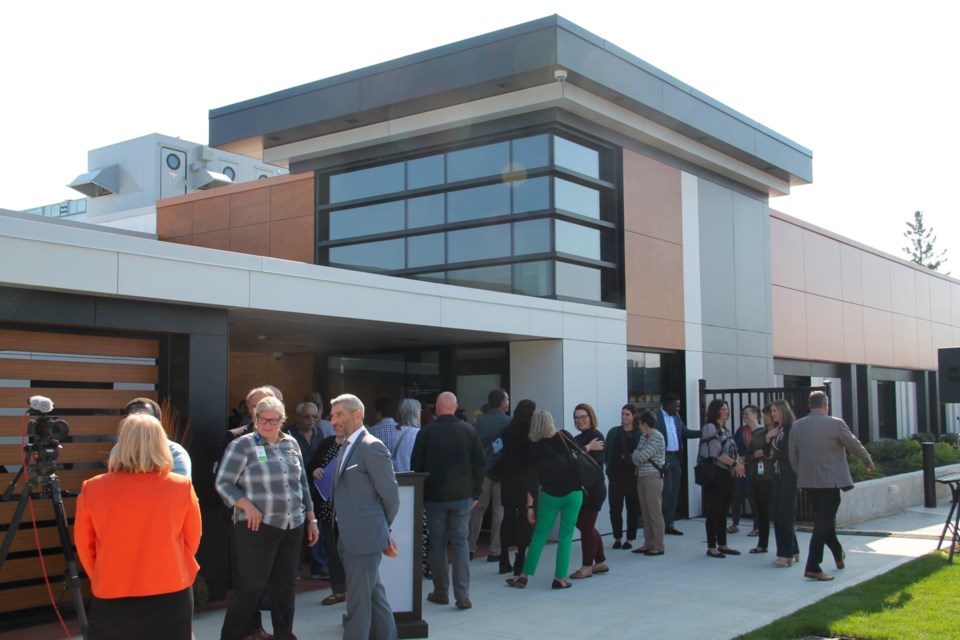While the new Northway Wellness Centre’s residential withdrawal management and safe beds service is now fully operational, another key part of Sault Area Hospital’s continuum of care for people living with mental health and addictions is experiencing longer-than-usual delays.
The Algoma Rapid Access Addictions Medicine (RAAM) clinic is intended for people seeking help with substance use disorders. It is supported by a multidisciplinary team that includes a navigator, a registered practical nurse, a nurse practitioner, an office assistant and addiction medicine physicians.
The provincial target for any new consult at a RAAM clinic is within three days, but the current wait time locally is just under two weeks. Increasing patient volumes and some human resources challenges are creating longer-than-desired wait times for care.
“The long and short of it is we have more people in our community that are presenting for care than we have people who can help care for them,” said Lisa Case, director of clinical program for mental health and addictions at Sault Area Hospital (SAH), talking about the challenges of staffing the RAAM clinic.
Individuals seeking care during the extended wait times at the RAAM clinic could be referred to community partners in the interim, like Road to Recovery, Ontario Addiction Treatment Centre or Recovery North.
“Our target would be to be able offer walk-in service, but due to those resource limitations we are not always able to do that,” said Case. “When people reach out for help, we really try and find out what is the best service for them on any particular day and in the longer term planning for them.”
Case said the vast majority of traffic for mental health and addictions concerns currently comes through the Emergency Department.
“We know that is often not the most appropriate location and we want to be able to get people the lowest-intensity care that meets their needs and not have to come to the hospital for crisis care,” said Case. “Certainly there is a space for that if it involves acute need, police involvement, emergency medical services — absolutely the Emergency Department is the place to go — but for a lot of times it can be avoided with a lower intensity community-based location.”
Case said the RAAM clinic has grown from its original staffing, but is currently under-resourced when it comes to physicians.
“Our team works very well, we have a nurse practitioner, an RPN, an addictions navigator and they work in very close proximity and in concert with our addictions counsellors and those teams are also supported by our addictions medicine physicians,” said Case. “When we started out we had physician support that was three half days a week. I don’t think we have quite three half days a week right now but we are relying on those physicians to to provide us what they can.”
Recently, the RAAM clinic team began outreach efforts at the newly opened Community Resource Centre.
Case noted the hospital is not immune to the staffing issues currently being experienced in many segments of the workforce, not just health care.
Dr. Curtis Obadan, the medical director of SAH’s Mental Health Program, said it is very difficult to find psychiatrists and family physicians who want to engage in addictions and substance use specialties. Interested physicians can gain knowledge and experience through partnerships with the Northern Ontario School of Medicine, University of BC and Women’s College Hospital in Ontario
“First you have to be a physician and interested in that aspect of medicine. It’s not everyone that will have that interest,” said Obadan. “One of the ways we are going to be able to close the gap, by training physicians and hopefully retaining them in our community.”
If a new $7.8 million application to co-locate SAH services at the Northway is approved, the RAAM clinic will be one of the existing services to relocate there.
This comes as Sault Area Hospital is actively pursuing the return of the Concurrent Disorders Intensive Day Treatment program, which was paused in 2022 due to a lack of funding. Case said if new funding is approved, the program will run in concert with the hospital’s other existing programming.
That program was designed so patients could avoid extended periods of time away from home or work by providing a structured, scheduled program of treatment activities five days or evenings per week at home or in another setting. If approved, it will operate virtually from both the SAH main site and from Northway.
Case said the hospital is anticipating a positive result from the funding application for the Concurrent Disorders Intensive Day Treatment program.
“As soon as we get that funding we will up and running with those supports and I think that particular programming is a game-changer for individuals who aren’t able to leave our community for care,” she said.
Case said SAH also temporarily scaled back its addiction medicine consult, which is based in the hospital’s main site.
”We slowed that a bit while we were in transition for withdrawal management safe beds so that we had the appropriate knowledge, skills and abilities to support clients day of and while we did staff training in the new building at Northway,” said Case.
The Office of the Chief Coroner says the number of local confirmed opioid-related deaths was down slightly in the first six months of this year versus the same period of time in 2022.
In the most recent statistics covering January to June of 2024, there were 17 confirmed opioid-related deaths within the Algoma Public Health unit, compared to 23 in the same months last year. That represents a 22.7 per cent decrease of confirmed deaths year-over-year, but the Coroner notes there are 22 local deaths in that date range it has deemed as probable.
Province-wide, a total of 1,056 confirmed opioid-related deaths were recorded, with 266 marked as probable.
